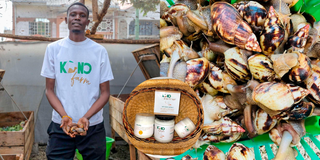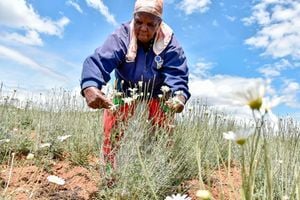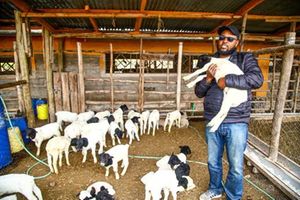
Snail farming at Kono Farm, founded by 25-year-old entrepreneur Ephraim Okeyo.
Standing at the forefront of a transformative shift in Kenya’s agricultural sector, Kono Farm, founded by 25-year-old entrepreneur Ephraim Okeyo, has elevated a modest endeavour into a prominent enterprise in snail farming.
Committed to addressing food insecurity and malnutrition through innovative and sustainable methods, the farm is reshaping local strategies for food production, nutrition, and agricultural innovation. Kono Farm’s mission is twofold: to provide high-quality, fresh snails to local and regional markets, and to create sustainable livelihoods through both snail meat and by-products.
Mr Okeyo’s personal experiences with food insecurity have driven his pursuit of creative solutions to diversify food sources. Beyond snail farming, Kono Farm produces beauty and skincare products from snail slime, capitalising on the growing demand for natural ingredients in the pharmaceutical and cosmetic industries.
"My foray into snail farming was deeply influenced by my upbringing. Growing up in an environment where three meals a day were not always guaranteed, I witnessed firsthand the pervasive issue of food insecurity, "he explains. In Kenya, where 20 per cent of the population suffers from malnutrition due to inadequate protein intake, these challenges motivated him to explore heliculture as a viable solution.

High unemployment rates further underscored the need for innovative job creation methods, making snail farming a dual opportunity to address both food scarcity and economic instability. Following his education, he faced the harsh reality of unemployment, a common struggle in his community.
This experience propelled him to seek unconventional solutions for sustainable livelihoods, leading him to snail farming, an area rich with untapped potential. Founding Kono Farm was his response to these challenges, aiming to generate employment and offer an alternative source of nutrition. He acquired expertise in snail farming through self-learning and formal education.
Initially engaging in extensive online research to grasp the basics of heliculture, his eagerness to deepen his knowledge led him to enroll in short courses, which offered practical insights and hands-on experience. "I enhanced my expertise and received in-depth training in sustainable farming techniques.
This education equipped me with essential scientific knowledge and practical skills, enabling me to implement advanced heliculture methods and optimise snail health at Kono Farm," he says, adding that his ongoing commitment to learning ensures that Kono Farm remains an industry leader in best practices.
The venture began with an initial investment of Sh5,000 from Okeyo's savings. Later, a partnership with Somo Africa resulted in a grant of Sh114, 000 for expansion. Additionally, he won $6,000 (Sh750, 000) from the Leilah Janah Foundation’s GiveWork Challenge which provided crucial support for further growth. Together, these financial resources have played a pivotal role in developing and scaling his business.

Entrepreneur shows some of the snails he has bred in his farm.
Okeyo says that establishing the farm involved several critical steps, including securing funding, selecting a suitable location, and designing an efficient farming system. Early challenges such as losing his first batch of snails, were addressed through thorough analysis, expert advice, and rigorous monitoring practices. These experiences contributed to refining his approach and building a more resilient farming operation.
To gauge demand for snail products, comprehensive market research identified growing interest in organic and sustainable food sources, particularly snail meat for its nutritional benefits. Expatriates and regions with a heightened awareness of natural product benefits, particularly from West Africa, further drive interest in snail meat and skincare, reflecting a shift towards holistic, health-focused consumption patterns.
Internationally, the farm is poised to expand its presence with existing orders for both snail meat and skincare products, reflecting a promising opportunity for global market penetration. "Snails offer a compelling alternative to conventional protein sources due to their attributes. They provide a low-fat, high-protein option comparable to beef and pork, appealing to health-conscious consumers.
Rich in Omega-3 fatty acids, snails support heart health, reduce inflammation, and enhance brain function," he says, underscoring their nutritional benefits. Okeyo communicates these benefits to customers through various channels. Social media campaigns, advertisements, and monthly workshops help raise awareness about the nutritional advantages of snail products.
Participation in organised exhibitions further allows Kono Farm to showcase the benefits of snails and engage directly with consumers. The skincare industry’s preference for natural ingredients highlights the demand for snail slime, valued for its regenerative properties. The market analysis identified the reliance on imported snail-based skincare products, indicating local market opportunities.
This assessment confirmed the potential for both snail meat and skincare products, prompting Okeyo to focus on these areas at Kono Farm. Snail farming is friendlier to the environment compared to, for instance, livestock farming since it requires less space. There is also the fact that snails produce minimal greenhouse gases and have a lower environmental footprint, establishing them as an eco-friendly protein source.
"I have implemented a variety of sustainable practices at my farm. This includes employing eco-friendly farming techniques that conserve water and eliminate harmful chemicals, thereby maintaining a low-impact production process. Efficient space utilisation and effective waste management further minimise land usage and promote recycling," he notes.
Employing eco-friendly farming methods like efficient water use and chemical-free practices further reduces the farm’s environmental footprint. “I specialise in farming Giant African Land Snails, recognised for their substantial size, fast growth rate, and prolific reproductive capacity, ideal for both meat and skincare products,” he says.
Their adaptability to diverse climates and ability to thrive under controlled conditions enhance suitability for farming, contributing to efficient output and meeting market demands. Okeyo’s day at the snail farm begins with inspecting conditions, ensuring optimal moisture levels for snail comfort. Morning activities include clearing food and waste to prevent infections, with evening feeding providing fresh, nutritious feed while monitoring snail health.
Regular inspections and maintenance throughout the day maintain a clean, efficient snail environment. Kono Farm currently holds 3,000 kilograms of snails, directly employing seven and indirectly supporting 13 employees. Challenges in expanding the snail farm, primarily due to funding constraints, initially limited production unit scaling and new product introductions.
Overcoming hurdles involved actively seeking and securing grants, awards, and financial assistance, alongside enhancing operational efficiency and resource utilisation. “Expert guidance and ongoing training strengthened my knowledge and skills, implementing rigorous monitoring and management practices to prevent future issues,” he says, refining strategies for a resilient, prosperous snail farming enterprise.
Beyond economic benefits, the initiative contributes significantly to community development, training youth and women’s groups to generate employment and promote self-sufficiency, enhancing community well-being. “Our diverse product range caters to various preferences and needs. Snail meat provides nutritious options for health-conscious consumers, complemented by skincare products utilising snail slime’s regenerative properties,” he says.

Kono Farm produces beauty and skincare products from snail slime, capitalising on the growing demand for natural ingredients in the pharmaceutical and cosmetic industries.
These offerings are in demand in the beauty industry and among those seeking natural, effective skincare solutions, each product harnesses snail benefits for culinary and cosmetic advantages. Snails are harvested at 140 grams in weight, with market prices varying by type and client preferences. Snail meat prices range from Sh2,000 to Sh4,000 per kilogram, based on sales as frozen, live, or oven-dried.
“Our skincare product line includes beauty soaps retailing at Sh650, creams priced between Sh650 and Sh800, as well as moisturisers and serums available in various sizes and formulations. ” The outlook for snail farming in Kenya and globally looks promising, driven by the demand for sustainable and alternative protein sources.
Snails’ adaptability to varying climatic conditions positions them as a resilient option for the future of food production,” he remarks. Okeyo’s notable achievements include winning the Youth-Owned Business of the Year award from Biashara Africa and being shortlisted for the Youth Business International Bootcamp.







